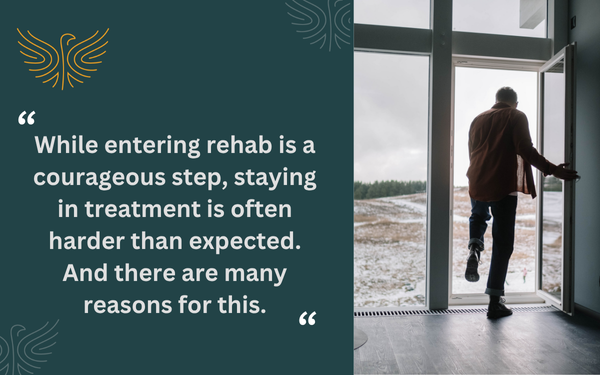Rehab is often portrayed as a life-changing solution, and for many, it is. But the reality is more complicated. A significant number of people leave rehab before completing their program, even when they desperately want recovery. In fact, research reports that between 30 and 50% of people drop out of their rehab programs. So, why does this happen?
The reasons are rarely simple. Recovery involves a complex range of emotions. It can also be difficult to be away from loved ones. Withdrawal further poses another challenge. On top of this, financial stress, stigma, and fear of change can also play a major role. And for many, the internal battle between wanting to get better and feeling unsure it’s possible becomes too much to bear.
Yet, leaving rehab doesn’t signify failure. Often, it simply means more support is needed or different tools are required for healing to take place. Below, we take a closer look at all of the above.
_______________________________________________________
Why Do People Leave Rehab Early?
While entering rehab is a courageous step, staying in treatment is often harder than expected. And there are many reasons for this, including the following.

Fear & Withdrawal
The biggest hurdle in early recovery is often withdrawal. Even with medical supervision, the physical and emotional discomfort can be overwhelming. Anxiety, nausea, insomnia, depression, and intense cravings can make it feel impossible to continue.
Additionally, for those who’ve relied on substances to cope for years, the thought of facing life without that crutch can be terrifying. This means that without the right support, fear, along with intense withdrawal symptoms, can drive someone to leave. But again, this doesn’t mean they can’t return. It doesn’t mean they’ve failed. Usually, recovery is a non-linear journey, and everyone takes their own path.
Denial
Many people might enter treatment believing that they do not even have a problem with substances. They might also hold the belief that their drug addiction is not as serious as that of their peers, and they, therefore, do not need treatment.
Yet, it’s worth noting that this denial isn’t necessarily conscious deception—it’s often a genuine belief system that addiction creates to protect itself.
When someone enters treatment while still experiencing significant denial, they may spend their time looking for evidence that they don’t belong there rather than engaging with the treatment process. They might focus on how they’re different from other patients, how their situation isn’t as severe, or how they have more control than others demonstrate.
The challenge with denial is that it often feels protective and logical to the person experiencing it.
Ultimately, breaking through denial requires a combination of gentle confrontation from treatment staff, peer influence from other patients, and often the accumulation of evidence that contradicts the denial. This process takes time, often longer than someone in denial is willing to stay in treatment.
Premature Beliefs That They’re “Cured”
After getting through initial withdrawal and starting to feel better, some individuals develop a false sense of confidence. Around seven to 14 days into treatment, this “pink cloud” phase can create the illusion that they’re already healed. As a result, they may want to leave—either because they believe they’re cured or they’re tempted to use again.
Feeling clear-headed and relieved to be substance-free, it’s easy to assume the hard part is over. But this overconfidence can be risky. Without completing treatment, they miss out on building essential coping tools, relapse prevention strategies, and a deeper understanding of their addiction.
External Pressures
Not everyone who leaves treatment early does so because of internal resistance to recovery. For instance, financial pressures can make extended treatment feel impossible, especially for those without adequate insurance coverage or family support. Work responsibilities, childcare needs, housing instability, and transportation challenges can all create urgent reasons to leave treatment that have nothing to do with readiness for recovery.
Family dynamics are another contributing factor to early treatment dropout. In some cases, family members—while acting with good intentions—may unintentionally enable premature departure by responding to requests to leave treatment early. Additionally, families may exert pressure on the individual to resume prior roles and responsibilities before sufficient recovery skills have been established.
Legal obligations, custody issues, and other external factors can further create competing pressures that make it difficult to prioritize treatment, even when someone intellectually understands its importance.
Program Mis-Match
In some cases, early departure from rehab is not due to the individual’s unwillingness to change, but rather a mismatch between their needs and the specific treatment program.
A person may simply require a different level of care; for example, transitioning from an inpatient program to an outpatient setting, or seeking treatment that addresses co-occurring mental health disorders or trauma. If these needs are not met, treatment may feel ineffective or misaligned with their personal goals.
Unrealistic Expectations
Individuals who enter rehab with unrealistic expectations may quickly become disillusioned. Those who anticipate immediate, dramatic improvements in all areas of life are likely to experience disappointment, which can become a justification for leaving treatment prematurely.
Some expect rapid transformation, not only in their substance use but in relationships, mood, and overall well-being. When the reality involves structured routines, emotional discomfort, and incremental progress rather than instant breakthroughs, frustration, unfortunately, often follows.
Recovery requires patience, acceptance of imperfection, and an ability to cope with uncertainty. Specifically, for individuals prone to perfectionism or influenced by overly optimistic portrayals of rehab, the discrepancy between expectation and reality can feel overwhelming. In turn, this can cause them to leave rehab early.
_______________________________________________________
Recovery: A Life-Long Process
When it comes down to it, leaving rehab early doesn’t signify the end of the road. Often, it means more support is needed or a different treatment approach is necessary. After all, every person’s recovery journey is different.
At Freedom Recovery Centers (FRC), we understand the ups and downs that come with this journey. We recognize that each person requires a personalized approach tailored to their unique needs. Whenever you’re ready, we’re here to help. Call us at 804-635-3746 or fill out our online form. Taking that first step today paves your way toward a better tomorrow, no matter whether it’s your first time in rehab or your last.
.svg)






.svg)

.svg)



.svg)
